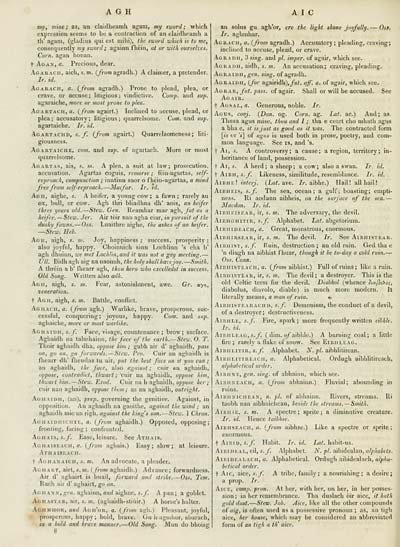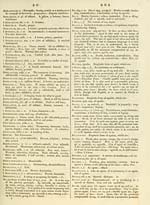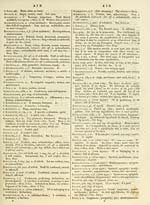Download files
Complete book:
Individual page:
Thumbnail gallery: Grid view | List view

A G H
A I C
mi/, mine; as, an claidheamh agara, m\/ suord ; which
expression seems to bu a contraction of an claidheamh a
th' agani, (gladius qui est niihi), the suord KÌiich is to me,
consequently niy sxiord ; againn fhein, at or with oursehcs.
Corn, agan honan.
t Agan, a. Precious, dear.
Ag ARACii, aich, s. m. {from agradh.) A claimer, a pretender.
Ir. id.
Ag ARACII, a. {from agradh.) Prone to plead, plea, or
crave, or accuse; litigious; vindictive. Comp. and sup.
agaraiche, more or iiwst prone to plea.
-Agartacii, n. {from agairt.) Inclined to accuse, plead, or
plea; accusatorv; litigious; quarrelsome. Cum. and sup.
agartaiche. Ir. id.
.•\gartaciid, s. y. (from agairt.) Quarrelsomeness; liti-
giousness.
Agartaiche, com. and sup. of agartach. More or most
quarrel.'some.
Agartas, ais, s. ni. A plea, a suit at law; prosecution,
accusation. Agartas coguis, remorse; fein-agartas, self-
reproaeh, compunction ; iiintinn saor o f hein-agartas, a mind
free from self reproach. — Mucfur. Ir. id.
Ac II, aighe, s. A heifer, ayoungcov/; a fawn; rarely an
ox, bull, or cow. Agh thri bliadlina dh' aois, an heifer
three i^eurs old. — Stetv. Gen. Reamhar mar agh, fit as a
heifer. — Stexc. Jer. Air toir nan agha ciar, in pursuit of the
duski/frwns. — Oss. Luaithre aighe, the ashes of an heifer.
—S'teu: Ileb.
Agii, aigh, s. ni. Joy, happiness ; success, prosperity ;
also joyful, happy. Choinnich sinn Lochlinn 's cha b*
agh dhuinn, xce met Locidin, and it was nut a gay meeting. —
Ull. Bidh agh aig na naoimh, the huh/ shall have joi/. — Smith.
A threin a b' fliearr agh, thou hero who excelledst in success.
Old Song. Written also adh.
Agh, aigh, s. m. Fear, astonishment, awe. Gr. ayr,,
veneration.
t Agh, aigh, s. m. Battle, conflict.
Aghach, a. [from agh.) Warlike, brave, prosperous, suc-
cessful, conquering; joyous, happy. Com. and sup.
aghaiche, more or most warlike.
AoiiAinii, .s. y. Face, visage, countenance ; brow; surface.
Aghaidh ua talmhainn, the face uf the earth. — Stew. O. T.
Tlioir aghaidh dha, oppose him ; gabh air d' aghaidh, pass
on, go on. go forwards. — Stew. Pro. Cuir an aghaidh is
flicarr dh' fheudas tu air, put the best face on it you can;
an aghaidh, ///(• face, also against; cuir «n aghaidh,
oppose, contradict, thwart ; cuir na aghaidh, oppose him,
thwart him. — Stew. Evod. Cuir na haghaidh, oppose her ;
cuir nan aghaidh, oppose them; as an aghaidh, outright.
Aghaidh, (an), prep, governing the genitive. Against, in
opposition. An aghaidh na gaoithe, against the wind ; an
aghaidh mic an righ, against the lung's sun.— Stew. 1 Chron.
.•\gii AiDiiuiiTr., a. {from aghaidh.) Opposed, opposing;
fronting, facing ; confronted.
Aghais,*./'. Ease, leisure. See Atii.ms.
Aghaiseach, (7. (from aghais.) Easy; slow; at leisure.
Atiiaiseach.
t Aghanaich, s. m. An advocate, a pleader.
Agiiart, airt,«.fn. (from aghaidh.) Advance; forwardness.
Air d' aghairt is buail, forward anil strike. —Oss. Tan.
Hach air d' aghairt, go on.
A(;h AN.N,^'r«. aghainn, fl«(/ aighnc, s.f. A pan; a goblet.
Aghastar, air, s. m. (aghaidh-stiùir.) A horse's halter.
Aghmhou, and Agh'ok, a. (from agb.) Pleasant, joyful,
prosperous, happy ; bold, brave, (iu li aguihor, abaiach,
in a hold and braxe manner. — Old Song. Mun do bhoisg
an solus gu agh 'or, ere the light shone Joyfully. — Os).
Ir. aghmhar.
Agrach, a. (from agradh.) Accusatory; pleading, craving;
inclined to accuse, plead, or crave.
Agradh, 3 sing, and pi. imper. of agair, which see.
Agradh, aidh, «. m. An accusation; craving, pleading.
Agraidh, gc/i. sing, of agradh.
Agraidii, (for agairidli),_/"«/. a/f. a. of agair, which see.
Aqr.xr, fut. pass, of agair. Shall or will be accused. See
Agaiii.
t Agsal, a. Generous, noble. /;■.
Agus, conj. (Dan. og. Corn. ag. Lat. ac.) And; as.
Thusa agus mise, thou and 1 ; tha e ceart cho rahath agus
a bha e, it is just as good as it was. The contracted form
[is or 's] of agus is used both in prose, poetry, and com-
mon language. See is, and 's.
t Ai, .9. A controversy; a cause; a region, territory; in-
heritance of land, possession.
t Ai, s. A herd ; a sheep; a cow; also a swan. /;■. iil.
t AiBii, s.f. Likeness, similitude, resemblance. /;•. id.
.AiBHF, ! inferj. (Lat. ave. /c. aibhe.) Hail! all hail!
AiBiiEis, s.f. The sea, ocean; a gulf; boasting; empti-
ness. Ri aodann aibheis, on the surjace of the sea. —
Macdon. Ir. id.
AiBHEisEAR, ir, s. m. The adversary, the devil.
AiEiiGHiTiR, s.f. Alphabet. Lat. abgetorium.
AiBiiiDEACii, a. Great, monstrous, enormous.
AiBiiiRSEAii, ir, .V. ?n. The devil. Ir. See Aibhistear.
AiBiiiST, «. /". Huin, destruction; an old ruin. Ged tha e
'n diugh na aibhist f huar, though it be to-day a cold ruin. —
Oss. Conn.
AiEHisTEACii, o. ( /"raw aibhist.) Full of ruins; like a ruin.
Aibhistear, ir, ,?. ?«. The devil ; a destroyer. This is the
old Celtic term for the devil. Diiibhol (whence Jl5(,')o^of,
diabolus, diavolo, diable) is much more modern. It
literally means, a man of ruin. «.
AiBHisTEARACiiD, S.f. Demouism, the conduct of a devil,
of a destroyer; destructiveness.
AiBHLE, s.f. Fire, spark; more frequently written cihhlc.
Jr. id.
Aij'.iiLEAG,i.y. ( dim. q/"aibhle.) A burning coal; a little
tire ; rarely a flake of snow. See Eibhleag.
AiHHLiTiR, i.y. Alphabet. A^ ;</. aibhlitirean.
AuiiiLiTiREACii, «. Alphabetical. Ordugh aibhlitireach,
alphabetical order.
AiiuiNE, gen. sing, of abhaiun, which see.
AiHHNEACii, a. (from abhaiun.) Fluvial; abounding in
ruins.
AiiiHNicHEAN', n. jd. of abhaiun. Rivers, streams. Ri
taobh nan aibhuichean, beside the streams. — Smith.
Auui.ìE, s. m. A spectre; sprite; a diminutive creature.
Ir. id. Ilcncc taibhse.
AiBHSEACii, a. (from aibhsc.) Like a spectre or sprite;
enormous.
t AiRiD, .s. y Habit. Ir. id. La/, habit-us.
Ai III DEAL, eil, s.f. Alphabet. iV. pt. aibidealan, alpliabits.
Aiiiinr.AEACii, a. Alphabetical. Ordugh aibidealach, a//)/(a-
bctical order.
t Aic, aice, v. /'. A tribe, family ; a nourishing ; a desire;
a pro]). Ir.
An r,, comp. prun. At her, with her, on her, in her posses-
sion ; in her remembrance. Tha duslach òir aice, it hath
gold dust. — Stew. Job. Aice, like all the other compounds
of «;^, is often used as a possessive pronoun ; as, an tigh
aice, her house, which may be considered an abbreviated
form of an tigh a th' aice.
A I C
mi/, mine; as, an claidheamh agara, m\/ suord ; which
expression seems to bu a contraction of an claidheamh a
th' agani, (gladius qui est niihi), the suord KÌiich is to me,
consequently niy sxiord ; againn fhein, at or with oursehcs.
Corn, agan honan.
t Agan, a. Precious, dear.
Ag ARACii, aich, s. m. {from agradh.) A claimer, a pretender.
Ir. id.
Ag ARACII, a. {from agradh.) Prone to plead, plea, or
crave, or accuse; litigious; vindictive. Comp. and sup.
agaraiche, more or iiwst prone to plea.
-Agartacii, n. {from agairt.) Inclined to accuse, plead, or
plea; accusatorv; litigious; quarrelsome. Cum. and sup.
agartaiche. Ir. id.
.•\gartaciid, s. y. (from agairt.) Quarrelsomeness; liti-
giousness.
Agartaiche, com. and sup. of agartach. More or most
quarrel.'some.
Agartas, ais, s. ni. A plea, a suit at law; prosecution,
accusation. Agartas coguis, remorse; fein-agartas, self-
reproaeh, compunction ; iiintinn saor o f hein-agartas, a mind
free from self reproach. — Mucfur. Ir. id.
Ac II, aighe, s. A heifer, ayoungcov/; a fawn; rarely an
ox, bull, or cow. Agh thri bliadlina dh' aois, an heifer
three i^eurs old. — Stetv. Gen. Reamhar mar agh, fit as a
heifer. — Stexc. Jer. Air toir nan agha ciar, in pursuit of the
duski/frwns. — Oss. Luaithre aighe, the ashes of an heifer.
—S'teu: Ileb.
Agii, aigh, s. ni. Joy, happiness ; success, prosperity ;
also joyful, happy. Choinnich sinn Lochlinn 's cha b*
agh dhuinn, xce met Locidin, and it was nut a gay meeting. —
Ull. Bidh agh aig na naoimh, the huh/ shall have joi/. — Smith.
A threin a b' fliearr agh, thou hero who excelledst in success.
Old Song. Written also adh.
Agh, aigh, s. m. Fear, astonishment, awe. Gr. ayr,,
veneration.
t Agh, aigh, s. m. Battle, conflict.
Aghach, a. [from agh.) Warlike, brave, prosperous, suc-
cessful, conquering; joyous, happy. Com. and sup.
aghaiche, more or most warlike.
AoiiAinii, .s. y. Face, visage, countenance ; brow; surface.
Aghaidh ua talmhainn, the face uf the earth. — Stew. O. T.
Tlioir aghaidh dha, oppose him ; gabh air d' aghaidh, pass
on, go on. go forwards. — Stew. Pro. Cuir an aghaidh is
flicarr dh' fheudas tu air, put the best face on it you can;
an aghaidh, ///(• face, also against; cuir «n aghaidh,
oppose, contradict, thwart ; cuir na aghaidh, oppose him,
thwart him. — Stew. Evod. Cuir na haghaidh, oppose her ;
cuir nan aghaidh, oppose them; as an aghaidh, outright.
Aghaidh, (an), prep, governing the genitive. Against, in
opposition. An aghaidh na gaoithe, against the wind ; an
aghaidh mic an righ, against the lung's sun.— Stew. 1 Chron.
.•\gii AiDiiuiiTr., a. {from aghaidh.) Opposed, opposing;
fronting, facing ; confronted.
Aghais,*./'. Ease, leisure. See Atii.ms.
Aghaiseach, (7. (from aghais.) Easy; slow; at leisure.
Atiiaiseach.
t Aghanaich, s. m. An advocate, a pleader.
Agiiart, airt,«.fn. (from aghaidh.) Advance; forwardness.
Air d' aghairt is buail, forward anil strike. —Oss. Tan.
Hach air d' aghairt, go on.
A(;h AN.N,^'r«. aghainn, fl«(/ aighnc, s.f. A pan; a goblet.
Aghastar, air, s. m. (aghaidh-stiùir.) A horse's halter.
Aghmhou, and Agh'ok, a. (from agb.) Pleasant, joyful,
prosperous, happy ; bold, brave, (iu li aguihor, abaiach,
in a hold and braxe manner. — Old Song. Mun do bhoisg
an solus gu agh 'or, ere the light shone Joyfully. — Os).
Ir. aghmhar.
Agrach, a. (from agradh.) Accusatory; pleading, craving;
inclined to accuse, plead, or crave.
Agradh, 3 sing, and pi. imper. of agair, which see.
Agradh, aidh, «. m. An accusation; craving, pleading.
Agraidh, gc/i. sing, of agradh.
Agraidii, (for agairidli),_/"«/. a/f. a. of agair, which see.
Aqr.xr, fut. pass, of agair. Shall or will be accused. See
Agaiii.
t Agsal, a. Generous, noble. /;■.
Agus, conj. (Dan. og. Corn. ag. Lat. ac.) And; as.
Thusa agus mise, thou and 1 ; tha e ceart cho rahath agus
a bha e, it is just as good as it was. The contracted form
[is or 's] of agus is used both in prose, poetry, and com-
mon language. See is, and 's.
t Ai, .9. A controversy; a cause; a region, territory; in-
heritance of land, possession.
t Ai, s. A herd ; a sheep; a cow; also a swan. /;■. iil.
t AiBii, s.f. Likeness, similitude, resemblance. /;•. id.
.AiBHF, ! inferj. (Lat. ave. /c. aibhe.) Hail! all hail!
AiBiiEis, s.f. The sea, ocean; a gulf; boasting; empti-
ness. Ri aodann aibheis, on the surjace of the sea. —
Macdon. Ir. id.
AiBHEisEAR, ir, s. m. The adversary, the devil.
AiEiiGHiTiR, s.f. Alphabet. Lat. abgetorium.
AiBiiiDEACii, a. Great, monstrous, enormous.
AiBiiiRSEAii, ir, .V. ?n. The devil. Ir. See Aibhistear.
AiBiiiST, «. /". Huin, destruction; an old ruin. Ged tha e
'n diugh na aibhist f huar, though it be to-day a cold ruin. —
Oss. Conn.
AiEHisTEACii, o. ( /"raw aibhist.) Full of ruins; like a ruin.
Aibhistear, ir, ,?. ?«. The devil ; a destroyer. This is the
old Celtic term for the devil. Diiibhol (whence Jl5(,')o^of,
diabolus, diavolo, diable) is much more modern. It
literally means, a man of ruin. «.
AiBHisTEARACiiD, S.f. Demouism, the conduct of a devil,
of a destroyer; destructiveness.
AiBHLE, s.f. Fire, spark; more frequently written cihhlc.
Jr. id.
Aij'.iiLEAG,i.y. ( dim. q/"aibhle.) A burning coal; a little
tire ; rarely a flake of snow. See Eibhleag.
AiHHLiTiR, i.y. Alphabet. A^ ;</. aibhlitirean.
AuiiiLiTiREACii, «. Alphabetical. Ordugh aibhlitireach,
alphabetical order.
AiiuiNE, gen. sing, of abhaiun, which see.
AiHHNEACii, a. (from abhaiun.) Fluvial; abounding in
ruins.
AiiiHNicHEAN', n. jd. of abhaiun. Rivers, streams. Ri
taobh nan aibhuichean, beside the streams. — Smith.
Auui.ìE, s. m. A spectre; sprite; a diminutive creature.
Ir. id. Ilcncc taibhse.
AiBHSEACii, a. (from aibhsc.) Like a spectre or sprite;
enormous.
t AiRiD, .s. y Habit. Ir. id. La/, habit-us.
Ai III DEAL, eil, s.f. Alphabet. iV. pt. aibidealan, alpliabits.
Aiiiinr.AEACii, a. Alphabetical. Ordugh aibidealach, a//)/(a-
bctical order.
t Aic, aice, v. /'. A tribe, family ; a nourishing ; a desire;
a pro]). Ir.
An r,, comp. prun. At her, with her, on her, in her posses-
sion ; in her remembrance. Tha duslach òir aice, it hath
gold dust. — Stew. Job. Aice, like all the other compounds
of «;^, is often used as a possessive pronoun ; as, an tigh
aice, her house, which may be considered an abbreviated
form of an tigh a th' aice.
Set display mode to: Large image | Transcription
Images and transcriptions on this page, including medium image downloads, may be used under the Creative Commons Attribution 4.0 International Licence unless otherwise stated. ![]()
| Early Gaelic Book Collections > J. F. Campbell Collection > Gaelic dictionary, in two parts > (98) |
|---|
| Permanent URL | https://digital.nls.uk/79299250 |
|---|
| Description | Volumes from a collection of 610 books rich in Highland folklore, Ossianic literature and other Celtic subjects. Many of the books annotated by John Francis Campbell of Islay, who assembled the collection. |
|---|
| Description | Selected items from five 'Special and Named Printed Collections'. Includes books in Gaelic and other Celtic languages, works about the Gaels, their languages, literature, culture and history. |
|---|

